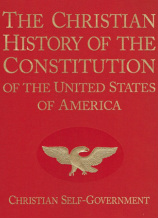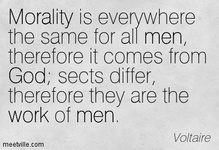|
History is being whitewashed thanks in part to the new Common Core education, which is "voluntarily forced" on school districts across the United States, especially those who want continue on the Federal Government's teat. Tabiatha Coral, COMMON COREruption (1st in a series), http://www.renewamerica.com/columns/korol/130711 (July 11, 2013); more on CC here - A.P. Dillon, Common Core Weekend Reads – 9-7-14, http://stopcommoncorenc.org/common-core-weekend-reads-9-7-14 (last visited Sept. 17, 2014) . It's not surprising, then, that most public schools wont have these on their student reading lists: Frank Lambert, The Founding Fathers and the Place of Religion in America (2003); Mark Beliles and Douglas Anderson, Contending for the Constitution, (Providence Foundation eds., 2005); John Eidsmoe, Christianity and the Constitution: The Faith of Our Founding Fathers (1987); . Augusto Zimmermann, LL.B, LL.M, Ph.D., The Christian foundations of the rule of law in the West: A legacy of liberty and resistance against tyranny, http://creation.com/the-christian-foundations-of-the-rule-of-law-in-the-west-a-legacy-of-liberty-and-resistance-against-tyranny (last visited August 25, 2014) From those texts and others, it is evident that the events that led to the successful creation of the United States Constitution was due to the Providence of the sovereign God, and not coincidence. There are several 'events' that occurred before, during and after the drafting of the constitution. With out them, today would look much differently. Secularists and others who believe that there was no correlation to Christianity and/or Biblical foundation nothing relating back to the Sovereign God should be Secularists would call them coincidences. The definition of coincidence as read from the Oxford Dictionary1: is:
Dr. Michael Stallard, who is a Baptist Bible Seminary Dean, Professor of Systematic Theology, and the Director of the Seminary Ph.D. program, also wrote a book supporting God's influence in the writing of the Constitution. Dr. Stallard reviews each piece of the final document, pointing out clearly that it was guided by a Biblical world view. He writes, "Perhaps the most remarkable evidence of a biblical worldview in the Constitution is the underlying belief in the depravity of men and women." Dr. Mike Stallard, The Biblical Basis of the United States Constitution, at 3 (2011) available at http://our-hope.org/blog/wp-content/uploads/2011/10/Biblical-Basis-of-the-United-States-Constitution1.pdf . He summarizes how the Constitution is ". . . [A] document designed to maximize protection against political abuse and to take full advantage of the blessings of liberty. . . ., it is safe to suggest that there is a biblical basis for the U. S. Constitution." It is prudent to point out that in 1776 the second convention came up with Declaration of Independence (the "why" they wanted to be their own Country) and the preliminary "how: Articles of Confederation, which created the "first continental-wide system of governance " and the The Declaration of Independence in 1776 had provided the "why," but now the "how" had to be decided. It took ten years for the Articles to be the binding document because of territorial dispute, and part of the agreement under the Articles is that all states had to sign off on it first. Once that happened, it was almost immediately known that in operation, it wasn't working out so good.
From the various books and articles already mentioned, there are least an estimated thirteen individual factors (one for each colony in a sense) that combined together for the formation of the Constitution at the Constitutional Convention of 1787, a "Grand Convention." There were several times the convention would have ended in failure. The Founding Fathers knew it was divine intervention that prevented it. (Keep in mind the Founders were grounded in the Biblical world view. I also have two other Constitution Day posts here. )
1 There was a third definition, but as it relates to physics it is not relevant for this discussion. 2 Additional comments regarding the delegates as stated by Dr. Gordon Loyd, author and editor of a series of Online Exhibits on the American Founding hosted by the Ashbrook Center’s website, TeachingAmericanHistory.org, and more:
Comments are closed.
|
AuthorKellyJaye Categories
All
Archives
April 2021
Quickly jump to visit my Right Rooms within this website:
|




 RSS Feed
RSS Feed
